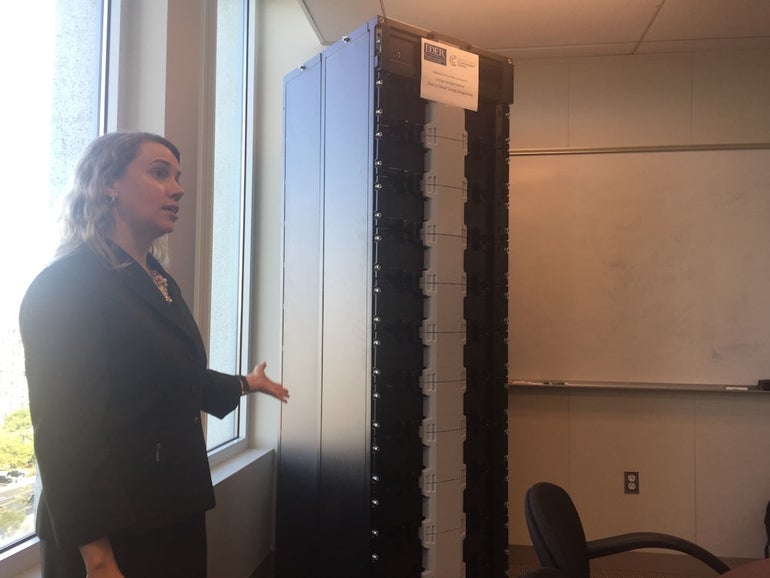The Baker administration intends to set energy storage targets for electrical utilities, a move that could fortify a developing industry that state officials believe could store 600 megawatts of power by 2025.
The Department of Energy Resources (DOER) determined it is “prudent for the Commonwealth to set targets for energy storage systems,” DOER Commissioner Judith Judson wrote in a letter to lawmakers Tuesday.
An energy diversification law signed by Gov. Charlie Baker in August gave the department the discretion to determine whether to set cost-effective energy storage targets for utilities to be achieved by January 2020. The law required the department to make a determination on targets by year’s end.
Power storage enthusiasts hope advancements will enable the stockpiling of electricity generated from renewable energy generators, such as wind turbines and solar arrays, when the wind is blowing and sun is shining. Electricity from batteries and other storage systems could then be tapped when consumer demand is high, alleviating some of the power grid’s reliability concerns.
Department of Environmental Protection (DEP) Commissioner Martin Suuberg told lawmakers last week that the state is on track to meet its requirement to reduce greenhouse gas emissions 25 percent below 1990 levels by 2020. The DEP recently proposed rules to achieve further emission reductions, including reductions from the transportation and electricity generation sectors.
The DOER is opening a public comment period ending Jan. 27 to consider “a variety of policies to encourage the cost-effective deployment of energy storage systems.” Judson said DOER will need to adopt storage targets by July 1.
“In structuring feedback, we will ask stakeholders to consider the appropriate target scale, structure, and mechanisms for the energy storage systems targets,” Judson wrote. Comments can be sent to Storage.DOER@massmail.state.ma.us before 5 p.m., Jan. 27.
In September, Baker administration officials said the state planned to fund up to half the cost of roughly 10 to 15 energy storage projects under an $11 million program aimed at creating 5 megawatts of storage. Dubbed the Advancing Commonwealth Energy Storage, or ACES, program, the funding could range from about $100,000 to more than $1 million per project, officials said at the time.
“This is a technology whose time has come,” Philippe Bouchard, the vice president of business development for Eos Energy Storage, told audiences in both in New York and Boston in September during an event convened by the Northeast Clean Energy Council and the law firm Foley Hoag. Bouchard said battery systems placed within skyscrapers can mitigate “bottlenecks” in the electrical distribution system.
Kelly Warner, president of Advanced Microgrid Solutions, in September credited state government officials in California for “aggressive renewable energy targets” that mandated certain amounts of storage for each utility.

